By Jazmin Justo
The 13th Annual New York Korean Film Festival showcases Korea’s unique films in a variety of genres such as crime thriller, romance, and suspenseful horror. The Peninsula’s filmmakers creativity to the genre cinema, making the country’s national film industry the most vibrant in East Asia. The Korea Society invited an exceptional group of Korean guests for a special press Q and A, including star director Ryoo Seung-Wan (Veteran); directors Shin Suwon (Madonna), and Hong Won-chan (Office); and actress Koh Ah-Sung.
Q: Since you mentioned that it’s your first time in New York and you’ve gotten a chance to get some exposure, if you made a movie in New York, have you got any idea of what kind of movie you will make in New York, would it be in direction of your film or in another direction? If you were in a film in New York, would you have any particular area or place you will like to have that experience?
Director Hong Won-chan: First off, when I went to Paris I didn’t get a good impression but New York is different. And I am used to making thriller films but if it’s going to happen in New York, probably not only thriller but maybe a romantic film. I think of Central Park as a good backdrop for film.
Director Ryoo Seung-wan: When I’m film making, I do think location is important but, more importantly, the life experiences that I’m going through take more importance in my films. So this is about my third or fourth visit to New York but every time I come here, I’ve really been nothing more than a tourist. So I would say my experience here is too short for that to be become a life experience, so to speak. So if you want to see me making a film based in New York, if you could give me the rent and money needed to live, I would consider that. (laughter) So if I am actually able to live here and gain some life experiences, we’ll see what happens.
Audience: Will anyone here like to volunteer their apartment? (laughter) Here’s the keys to my apartment! (laughter)
Director Shin Suwon: So I think for me, during the short time I was here, the New York subway made an lasting impression on me. (laughter) The steel structures are all underground. Actually one of my earlier films, “Circle Line”, was filmed solely on the Korean subway so I think that’s what made a lasting impression on me. Another thing that I thought was interesting to me was seeing performing musicians/artists playing on the platform of the subway, that was also an interesting point I was thinking about. And the place where I was at, near the Museum of the Moving Image, which was a paper factory, there was a lot of factories there. So when I was riding the subway on my way to Manhattan, I was seeing steel structures and steel bridges, and that was very memorable for me. Going to Central Park, I feel I was drawn more to these sort of droll like things, and I don’t know if it’s because I have some sort of darkness (laughter) but I thought that was interesting as well. And like director Ryoo said, I haven’t had the luxury to be here a long time and if you guys are willing to invest in me. (laughter) Of course, staying here I will be able to think about my next movie.
Actress Koh Ah-Sung: I’m not a director but I wouldn’t mind acting in New York.
Q: Each of your films have been at other famous film festivals around the world, and I’m curious, when you are in front of press like us, what you take away, or even when interacting with the viewers, what you take away from seeing these different perspectives through the eyes of Westerners, that may affect, perhaps, the way you produce your films in the future, whether its acting or creating the film.
Director Hong Won-chan: Actually I think about those things. In my kind of films, I can tell at which points and which scenes the viewers will react. It’s very obvious how they react and sometimes I agonize over it. I will like to consider that in my next work. Definitely the Korean viewers and Western viewers are different and they react differently. I work mostly in Korea, so my goal is to how am I’m going to attune these two audiences. When I attend these festivals, I definitely learn and experience new things.
Director Shin Suwon: Actually, it’s the first time that my films I’ve shown, that I watch it. At film festivals, I frankly I couldn’t really enjoy it as much because I tense up, when I watch my films. So when “Madonna” was first released in Korea, it wasn’t released in that many theaters, so I was feeling quite guilty about that because my crew and my staff had worked really hard to make this film but it hadn’t really succeeded commercially. So I thought, maybe next time I was should work on a commercial feature. But when I come to international film festivals, I met audience members that have come up to me and said ‘Oh, I wish you can keep on making films like Madonna’ and those are comments that really motivate me to keep on making films that I keep on making today. In terms of audience responses, I don’t think they’re too different, just judging from American and Korean audiences. I think we sometimes tend to have similar sentimentalities towards the material I am presenting. But I feel that meeting audiences worldwide is one of the biggest take always I get from attending these film festivals.
Director Ryoo Seung-wan: So for me, when I first started attending film festivals internationally, it was very shocking to me just to experience an international audience’s would respond to my films. What I realized while I was attending these film festivals is that people who come to these festivals are prepared to enjoy your film. (laughter) I realized that, pretty much, whatever film you come with, they’re going to enjoy it, regardless of what the film looks like.
So for me, at the beginning of attending film festivals, it sort of has evolved. When my film hasn’t done commercially well in Korea, I would go to these film festivals and sort of find some source in people who like film and also if my film has been doing very well in Korea, I will come to these festivals and meet countless of people who love film, and I also experience a feel of humility from when you meet such wonderful filmmakers worldwide.
So I guess another thing I realized from attending film festivals, I do not believe that films targeted toward an international audience is not necessarily successful, I feel like the most successful films, are films targeted or reflect the lives of the people that are from my homeland. That I guess for myself, that has been a point for me, where I decided to make really unique films that I am making and I hope to make in the future.
A little side note I guess would be that, when I attend these film festivals and get on airlines, sometimes I’m not able to get on Korean airlines services. In those times, I found that it is utterly impossible to receive service in Korean. So sometimes, (chuckles) I always think ‘Koreans should get out of the country more and start dating internationally and international marriages should happen’ so Korean people out there can get more and more attention.
Q: It’s been really fascinating to watch you develop as an actress starting from “The Host” up to now. And as such a young actress up to now, and you’ve worked with really great directors, including the gentleman next to you and Bong Joon-Ho. So I was wondering, what goes into choosing a role, is it the director’s reputation or script?
Actress Koh Ah-Sung: I’m not sure whether you will believe it but I choose with my feelings. Which ever that attracts me, I pick and be a part of it. One thing is that I always want to do a different kind of opposite role. If I have very soft gentle one, where you have to restrain your emotions, than the next one I want something that’s like an outburst of feelings. Interestingly, after the elegant one, I was making “Office” and then I thought I thought I would like to act in some film that is more mentally sound and normal. (laughter) Then, it happened. I finished a film “A Memory to Remember” which is finished and is going to be shown next year in Korea.
Q: For Mrs. Shin, it’s also been interesting to watch you develop as a director. I enjoyed your two other films, “Passerby #3” and “Pluto”. What was interesting was that yesterday, you spoke a bit about the warring classes and how women are treated in these specific situation. Usually in films its either one or the other, but you take on the two at the same time. I was wondering how did that develop, did you start with women or with class first and how did you take hold of these two subjects?
Director Shin Suwon: First of all, I would like to thank you for viewing all my previous films. To tell you the short answer to your question would be the latter is correct. It evolved from one theme into the other. And it first started off, the title actually, started off as the “VIP Hospital Ring”, which it deals with richer patients in a very specialized hospital. So the three main characters started off with a rich man and his son, who is unnecessarily extending his father’s life in order to gain money and then, the nurse’s aide who is helping out with that scheme, well not scheme, in that situation. But while I was in the screener writing process boards, I thought it wasn’t as interesting and it felt like my previous film “Pluto” which seemed like I had just moved the location into a hospital. As I was dealing with that sort of problem, I thought of the image of a homeless woman that I had seen previously at a café in Seoul. From that person, I conceded the character of Mina “Madonna”, who the rich man’s son wants to get as a donor for a heart transplant. While that happened, the story actually evolved, concerning just the character’s within the hospital to a story that went to concerning more the nurse’s aide and the character Mina. So yes, it started with one thing and then it went to the other.
Q: This question is for Director Ryoo. As a fan of your previous films, each movie focuses on a different problem in society and has very realistic characters. How do you choose the social or political film for each film and what inspires you?
Director Ryoo Seung-Wan: I’m not a filmmaker that is consciously trying to make films in terms of propaganda. What I’m really interested in is the problem of the individual. But when you’re dealing with the individual, because the individual lives within society, it is sort of inevitable that the problems of society will seep through. So in essence, I’m trying to express my world view, so to speak, through the main characters in my films. I don’t believe it’s an issue of politics that governs whether there’s hope or despair in life, I think what it really comes down to is the relationship between a human being and another human being. But because when I’m in the filmmaking process, because I’m not just focusing on the individual alone, but I am actually depicting the relationship that human beings have with each other and their surroundings, I can understand how my films can be viewed as social commentary.
Q: Was the “Office” done in a actual office or did you build the set? Was it shoot chronologically or in different order and what kind of challenges, in terms of getting Ms. Koh’s performance, since she really changes through the course of the movie.
Director Hong Won-chan: It is not a real office. There was a whole entire floor that was empty so we borrowed it and built the set for “Office”. Since it took place in a limited space, the line of movement was very important, so that was considered. Also, when I designed the set of the office, I had those in mind, and the views you see through the windows, those are computer graphics. Since we had the entire floor to us, some of it I shoot chronologically, but Ms. Koh’s role of emotional up and down was tremendous. So for some were crazy for one moment and normal the next. (laughter) Some things I couldn’t shoot chronologically.
Q: Was this your directorial debut?
Director Hong Won-chan: Yes. That is correct.
Q: I don’t know if Director Shin and Director Hong know this, but they have a common thread in referencing a drama called “Misaeng”. We spoke about this in our interview, and I know you mentioned a drama in another other interview, in sort of a reflection of pressures that people in their 20’s and 30’s are going through. I also feel like another common bond even in the joyfulness of “Veteran” is class inequality. There’s that tension of the rich and the poor, the “haves” vs. the “have-nots”. And as you and I were speaking, there’s this sort of phenomena of films now that are addressing this. Are you sort of conscious of this? Is this something you are conscious of as film makers that you want to bring forward in your films?
Director Hong Won-chan: To be honest, I had to address this question earlier, so I was sort of out of it. (laughter) Firstly, I don’t think it’s the mainstream tendency in Korea, at the moment. When people choose the films for overseas film festivals, I think there’s more demand in that kind of film, so then they get chosen. I don’t know what my next film is going to be like, but depending on the director and the directors’ tendency and individual characteristics. But, I think I will stick to what I’ve been making. I make short ones but this one is my first full length feature film.
Director Shin Suwon: So as Director Hong just mentioned, I do want to say that not all Korean films deal with certain social issues. But also like Director Ryoo just said, because individuals do not exist in a vacuum, and as a result of creating relationships, I think naturally social issues seep into my films as well. I was thinking that this is not just restricted in Korea, it can happen internationally. The unemployment rates will rise, the disparity between rich and poor is a worldwide phenomena. While I was here for a short time, I would hear stories about Donald Trump and (chuckles) I feel like those issues are still going on right now. So my next film is something that is vastly different from this film “Madonna”, but I still feel that these sort of tendencies that I have, my viewpoints on society will naturally seep into my next film as well.
Q: “Snowpiercer” was shown here last year, and Ms. Koh I know you were in it and the film had a great review. Do you have intention to take part in the English language films in the future? And are you going to be part of “Opp-cha”?
Actress Koh Ah-Sung: Last year, when “Snowpiercer” was shown here I wanted to attend but, because of schedule conflicts, I couldn’t come. I feel sorry about that. Well, if there is any opportunity to work in the English language, I’m willing to do that because I like new things and I get drawn to new things. And working with the same director more than once, “A Memory to Remember” was one of the films like that. And about “Opp-cha” that you asked, I think you should ask Director Hong. (chuckles)
Q: Last question of the meet, what’s next for you all?
Director Hong Won-chan: Nothing is decided for now, but when I return home, I’m going to be seriously thinking about it.
Director Shin Suwon: So my next film is about a forest and we’ll be starting to film next summer. I was in Central Park a few days ago and I was looking at the trees and I was like ‘Wow. I wish I could just take these tress and send them back to Korea.’ but I don’t think that’ll be possible. (chuckles) I would try my best to do a good job about my next film about the forest.
Director Ryoo Seung-wan: My next film is based during the period of 1944 and 1945, and it deals with people who’ve been kidnapped and being forced to work with Japanese underwater investigators who are trapped on a island and are trying to escape them. So that’s what I’ll be working on.
Actress Koh Ah-Sung: Like I mentioned, I finished filming “A Memory to Remember”. But after New York, I’m going to go to Los Angeles. I’m going to meet up with some people and the next film will be decided there.
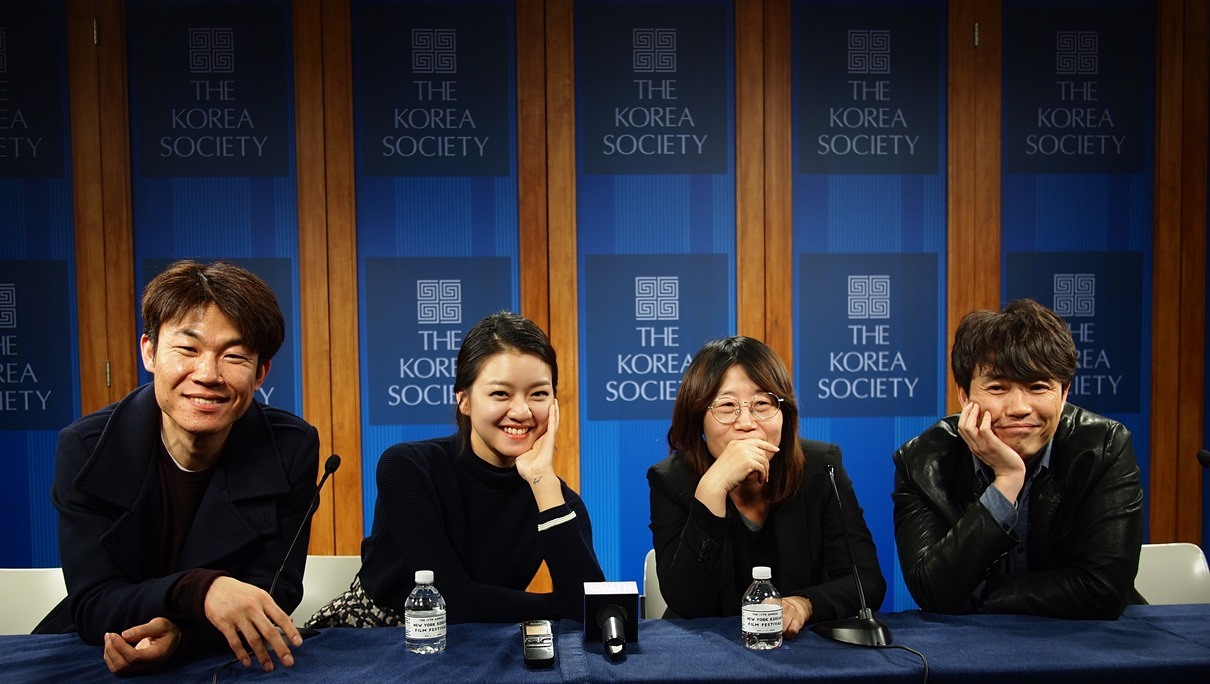
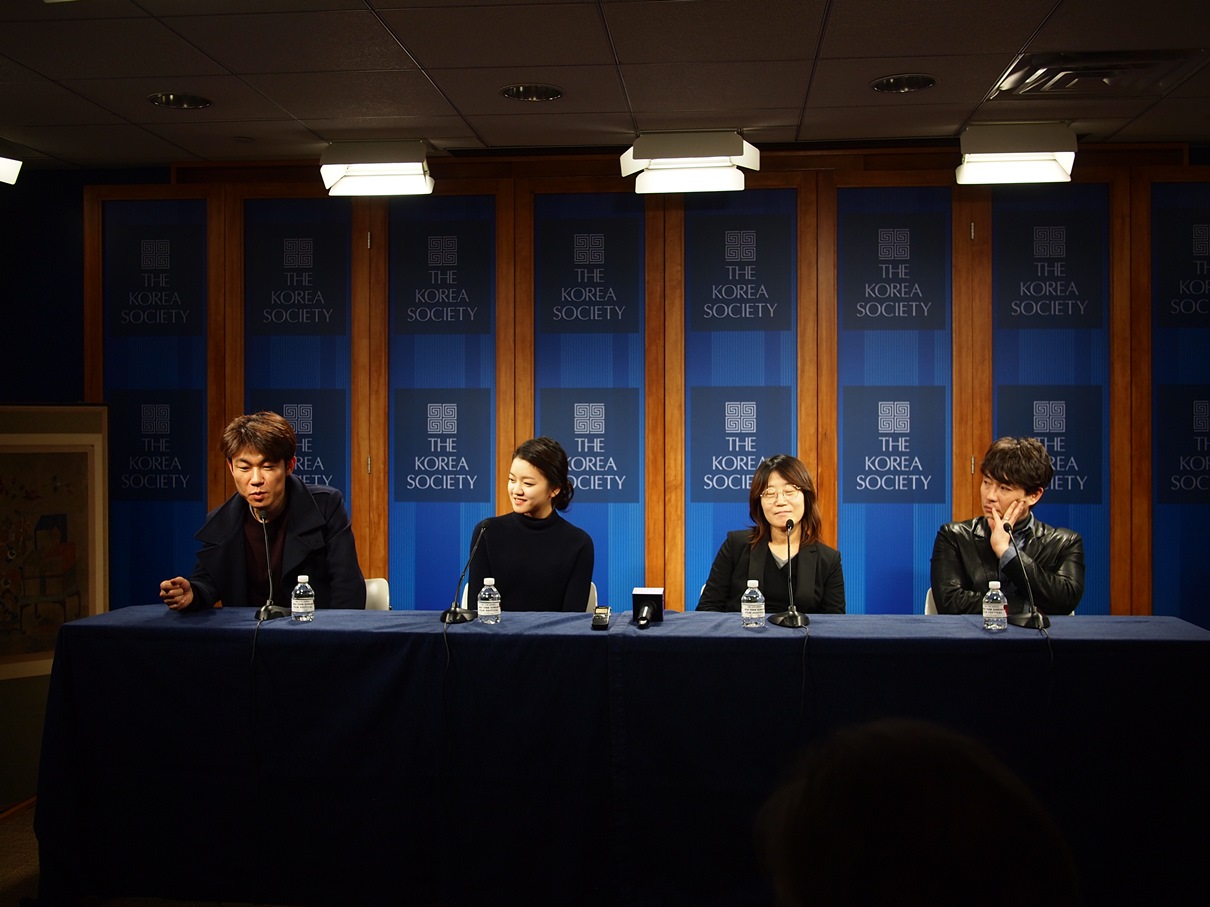
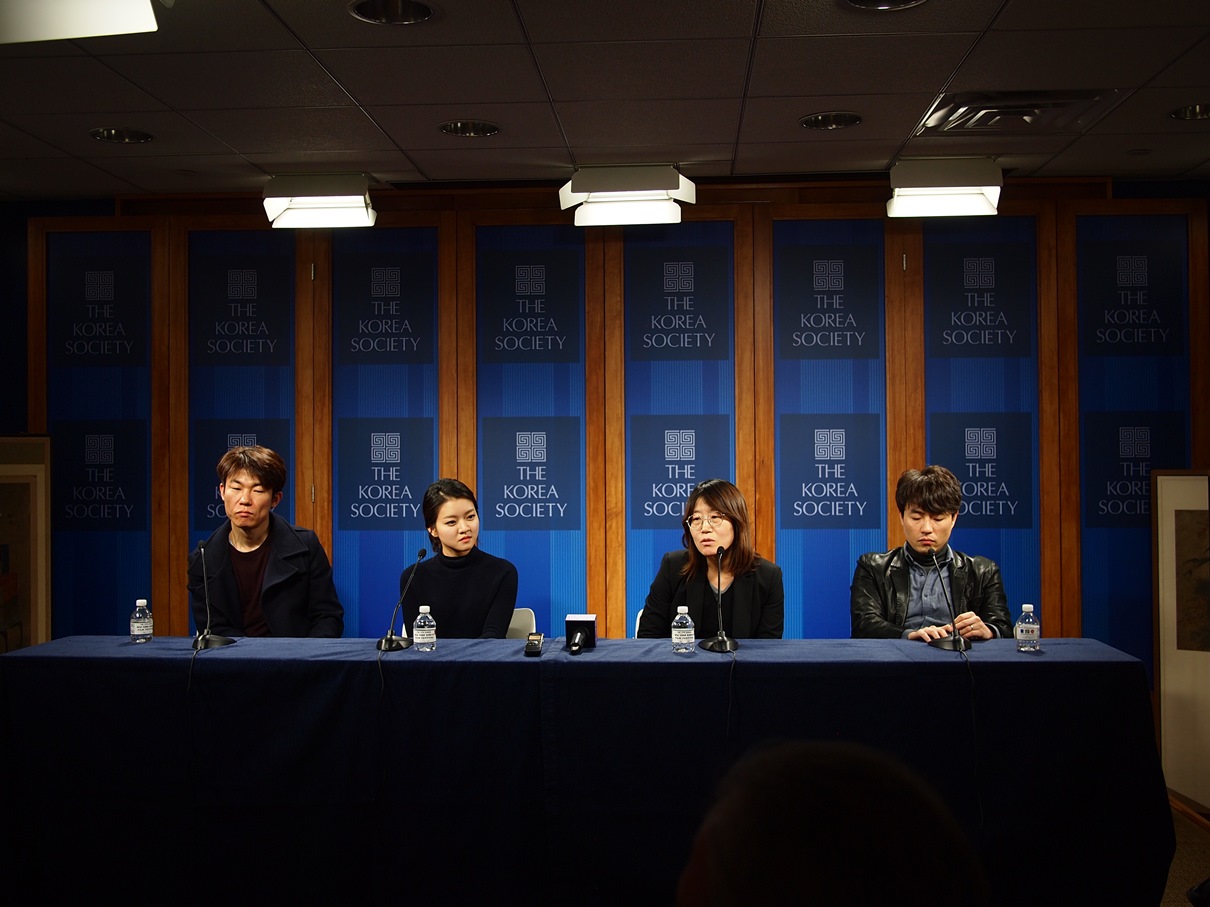
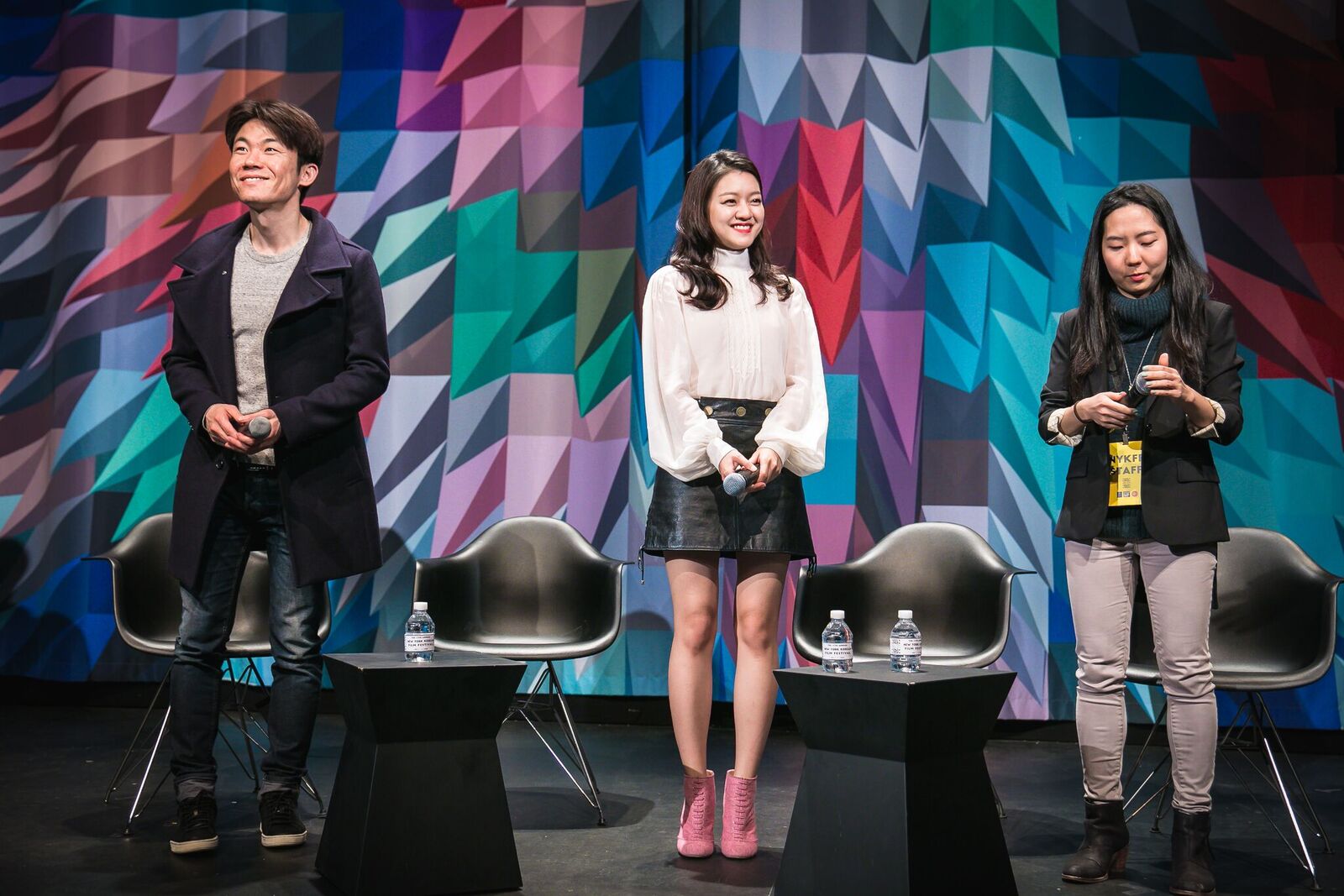


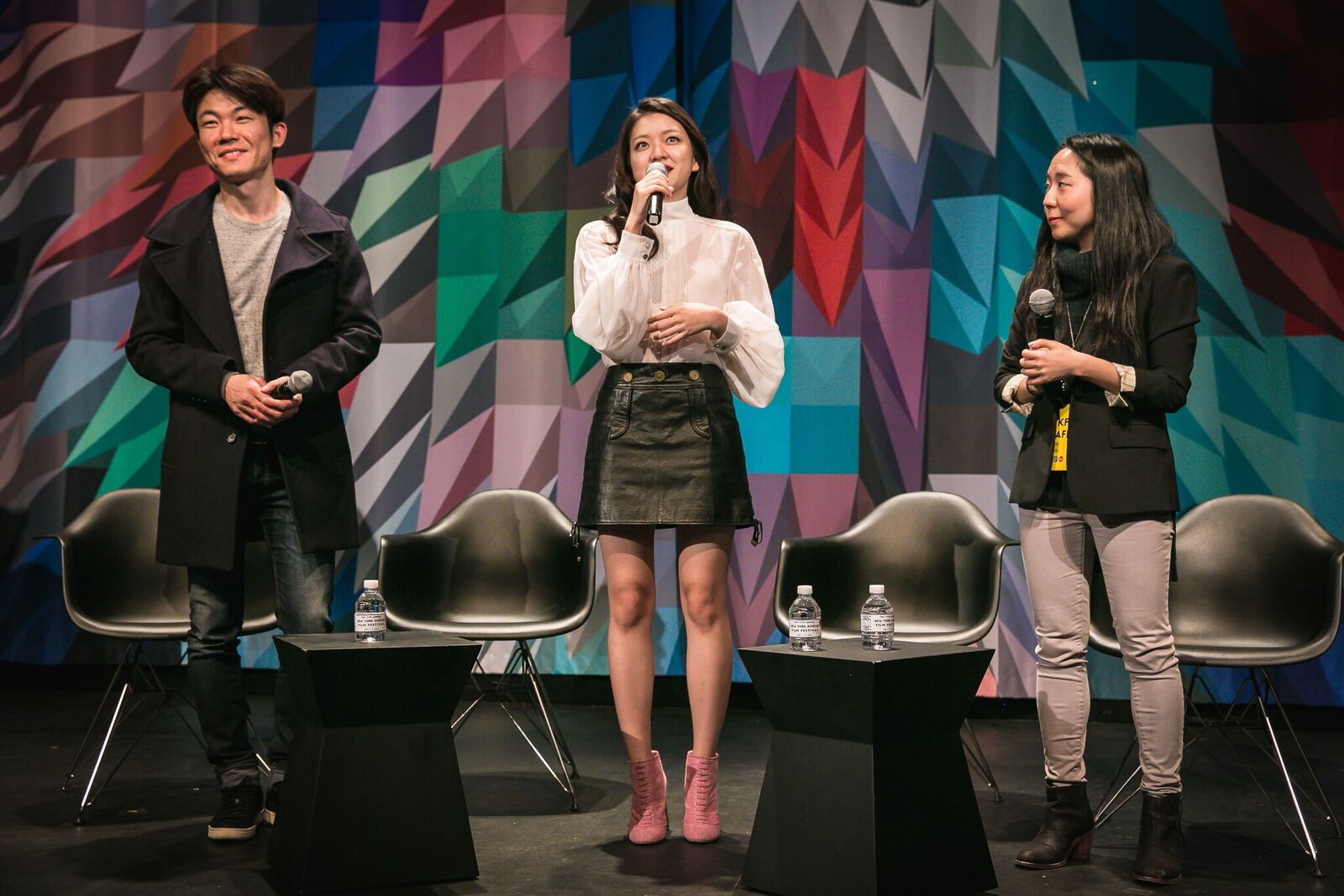
Leave a Reply